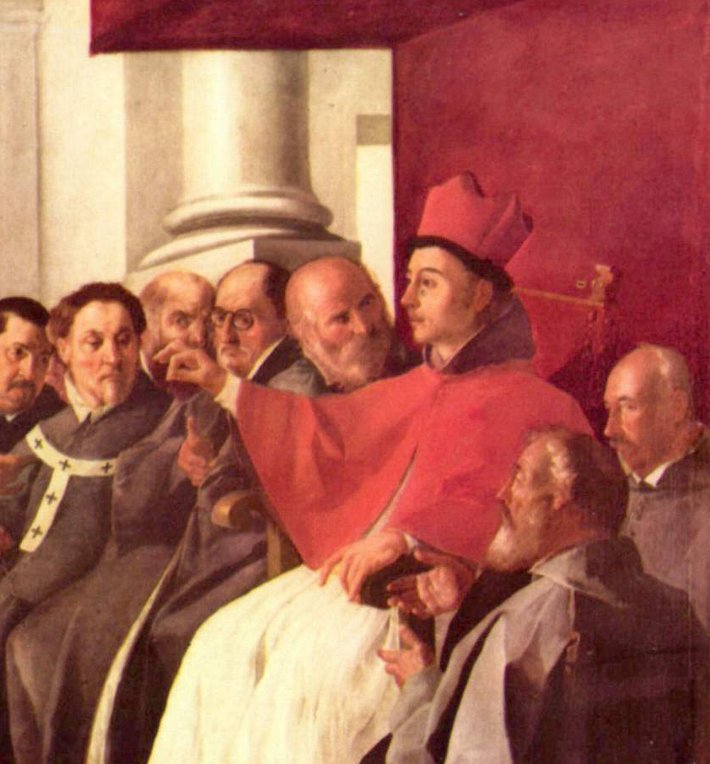Saint Bonaventure

Saint Bonaventure (1221-1274) was one of the most influential medieval theologians and philosophers. He is celebrated for his outstanding ability to reconcile the opposing theological and philosophical traditions. In 1482, he was canonised by Pope Sixtus IV and one century later, Pope Sixtus V declared him Doctor of the Church.
Early Life
Little is known about Bonaventure’s early life. He was born as Giovanni di Fidanza in 1221 at Bagnoregio in Latium (at the time an integral part of the Papal States) to Giovanni di Fidanza and Maria Ritella. During his childhood, he fell severely ill and according to Bonaventure, he recovered due to the intercession of St. Francis of Assisi. At the age of 14, he went to Paris to study at the University of Paris. In 1243, he was awarded master of arts degree and in the same year, he joined the Franciscan Order and took the name Bonaventure.
Later Life
After graduating at the University of Paris, he studied theology in the French capital. In 1254, he became master of theology and taught at the Franciscan school until 1257. In the same year, he was awarded a doctor degree at the University of Paris and soon thereafter, he was elected as minister general of the Franciscan Order. His election on the position of the minister general of the Franciscans was influenced greatly by his successful defence of the mendicant orders against the secular professors. These were led by William of Saint-Amour who wanted to exclude the members of the mendicant orders from the teaching positions at the University of Paris.
At the time when Bonaventure became the minister general of the Franciscans, the order was divided into the so-called Spirituals who were strictly advocating poverty and the Relaxati who proposed a more relaxed lifestyle. With his authority, he managed to restore the unity of the Order and reformed it in the spirit of its founder, St. Francis. In 1260, Bonaventure reformed the Order’s constitution as well as successfully defended it from Gerard of Abbeville, a theologian and opponent of the mendicants at the University of Paris. Later, he also stood up against the attempts to exclude revelation from philosophy by some masters at the University.
In 1273, Pope Gregory X named Bonaventure as Cardinal Bishop of Albano (Italy) despite the fact that ten years earlier, he refused the post of the Archbishop of York. In 1274, he was consecrated by the Pope in Lyon and resigned as minister general of the Franciscan Order. He took part at the Council of Lyon later that year and played an important role in the church reforms, reconciliation of the secular clergy and mendicants as well as in restoration of the union between the Greek and Roman Catholic churches.
Mysterious Death
Bonaventure died during the Council of Lyon in 1274. The cause of death is unknown but according to the chronicle of his secretary Peregrinus of Bologna, Bonaventure was poisoned. He was buried in the Church of the Friars Minor at Lyons on the day of his death.
Philosophy and Works
Bonaventure’s greatest works are commentaries on the Bible and the Sentences (a textbook that was written by Peter Lombard in the 12th century), followed by Breviloquium (“Summary”) and De Reductione Artium Ad Theologiam (“On the Reduction of the Arts to to Theology”) which reveal both his theological and philosophical views. These as well as later works such as Itinerarium Mentis in Deum (“Journey of the Mind to God”) reveal that he followed the teachings of St. Augustine but they also reveal the influence of ancient philosophers, most notably Aristotle. Just like his personal life, his works reflect an outstanding ability to reconcile contradictory traditions in both theology and philosophy which is why he was considered one of the foremost scholars already by his contemporaries.
Bonaventure was both a theologian and philosopher but like all the philosophers of his time, he was first a theologian and only then a philosopher. He considered philosophy inferior to theology although he viewed philosophy in itself as the highest science. Bonaventure did not reject Aristotle although he criticised his “defects”. He did, however, oppose the new ideas that appeared in Scholasticism in the mid-13th century and remained loyal to the traditional view that was based on the teachings of St. Augustine.
The “Commentaries on the Sentences” are traditionally viewed as Bonaventure’s greatest masterpiece. The book that contains over four thousand pages is divided into four books and deals with all the main questions of Scholasticism. Besides theological and philosophical works, Bonaventure also wrote many works that are related to religious subjects, especially to the Franciscans. In addition to re-codifying the constitution of the Order, he had also rewritten St. Francis biography titled the Life of St. Francis of Assisi.
Some Bonaventure’s works are unfortunately lost, while many were wrongfully attributed to him. Works that were attributed to Bonaventure but are thought or proven to be written by other authors are referred to as Pseudo-Bonaventure. Examples include Centiloquium, Philomena, Stimulus Amoris, The Legend of St. Clare, Biblia pauperum, Meditationes vitae Christi, Theologia Mystica, Speculum Disciplinae and some others.